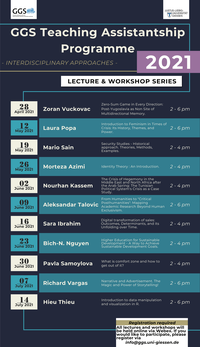[Online] GGS Teaching Assistantship Programme: From Humanities to ’’Critical Posthumanities’’: Mapping Academic Research Beyond Human Exclusivism
- https://www.uni-giessen.de/de/fbz/zentren/ggs/veranstaltungen/index_html/sose2021/workshop_talovic
- [Online] GGS Teaching Assistantship Programme: From Humanities to ’’Critical Posthumanities’’: Mapping Academic Research Beyond Human Exclusivism
- 2021-06-09T14:00:00+02:00
- 2021-06-09T18:00:00+02:00
09.06.2021 von 14:00 bis 18:00 (Europe/Berlin / UTC200)
Online via Webex
Feel free to join the lecture and workshop series of the Teaching Assistantship Programme 2021
| WORKSHOP | ||
|
Lecturer: | Aleksandar Talovic | |
|---|---|---|
| Date: | June 9, 2021, 2.00 pm to 6.00 pm | |
| Application deadline: | May 30, 2021 |
This workshop is part of the GGS Teaching Assistantship Programme 2021.
Content
This workshop draws on general issues of Humanities as a discipline while grappling with post- and transhumanist re-thinking of ’human’ as a fading episteme (Foucault, 1966). In an attempt to examine the abovementioned theoretico-practical trajectories, I argue that both specified fields (each in in their own ways, considering various clusters and plurivocal positions among each of its subfolders) deal with the Enlightenment procedures of understanding ’man’ as a fairly limited paradigm, heavily exclusive and radically parochial towards almost anything that exceeds its pre-enframed conceptual realm. On the other hand, especially Posthumanism opts for a more inclusive and ’ontologically democratized’ strategy of putting in concert both the so-called ’human’ and ’non-human’ spheres of interest, mainly by deconstructing their fixed boundaries, falsely produced by, as Bruno Latour asserts, actually never-existing modernity (Latour, 1991). The starting point of my reasoning in this direction is that such transposition from the Humanities towards the emerging ’’Critical Posthumanities’’ (Braidotti, 2018) could fundamentally restructure the research anatomy on both local and global levels of academia and I would like to share, problematize and openly discuss the potential implications of such a shift. Thus, using various inter-, trans-, and meta-disciplinary theoretical proposals, suitable video materials and a few case studies, the participants will be introduced to re-conceptualized notions of traditional pillars of Humanism (and Humanities as its scholarly implementation), such as: subject, object, body, agency, ontological hierarchization, human, animal, nature, culture, politics, and similar. In addition to somewhat more celebratory readings coming from posthumanist scholarship, the special emphasis will be put on critical approach towards the emerging ’flattening’ of the question of being, bringing the loud alarm on the fact that this way human responsibility is not to be abolished, but rather quite the opposite (Carranza, 2018).
Further information is available in the syllabus.

